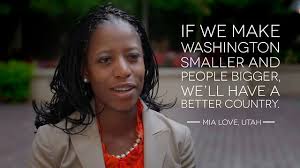Republicans’ First Black Congresswoman
Share
Explore Our Galleries
Breaking News!
Today's news and culture by Black and other reporters in the Black and mainstream media.
Ways to Support ABHM?
By Justin Moyer, washingtonpost.com
For at least half a century, the party of Lincoln has battled charges that it is racist, sexist and anti-immigrant.
 Today, voters from a conservative state made those arguments a little bit harder to make. In Utah, Mia Love became the first black Republican woman — and first Haitian American — elected to Congress.
Today, voters from a conservative state made those arguments a little bit harder to make. In Utah, Mia Love became the first black Republican woman — and first Haitian American — elected to Congress.
For the GOP — a house divided that faces significant demographic hurdles to winning the White House in 2016 even as it celebrates President Obama’s shellacking — this was huge. A party threatened with electoral extinction among African Americans and immigrants now has someone to brag about in Washington. In a wave election less about fresh Republican ideas than fervid disapproval of all things presidential, Love’s compelling personal story is an oasis. She’s not just a black face in what’s often described as a party full of angry old white men. She’s a path forward.
It’s hard to overstate how unlikely Love’s victory looked on paper. Utah is less than 1 percent black. Though more than 60 percent of the state’s people identify as members of the Church of Jesus Christ of Latter-day Saints, the church is just 3 percent black. Love, 38, is one of these few black Mormons — part of a church that, until 1978, didn’t let African Americans participate in all church activities and still hasn’t apologized for its racism.
Yet, a woman born in Brooklyn to Haitian immigrants is now a duly-elected representative of the Beehive State.
Read full article here.
Read more Breaking News here.











Comments Are Welcome
Note: We moderate submissions in order to create a space for meaningful dialogue, a space where museum visitors – adults and youth –– can exchange informed, thoughtful, and relevant comments that add value to our exhibits.
Racial slurs, personal attacks, obscenity, profanity, and SHOUTING do not meet the above standard. Such comments are posted in the exhibit Hateful Speech. Commercial promotions, impersonations, and incoherent comments likewise fail to meet our goals, so will not be posted. Submissions longer than 120 words will be shortened.
See our full Comments Policy here.